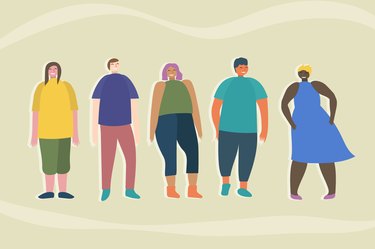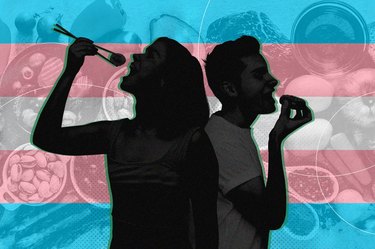
Have you ever felt so overjoyed by how you're presenting your gender identity to the world that you felt like singing? Then you've experienced something called gender euphoria.
"Gender euphoria is being able to live your authentic self openly and without fear," Jerrica Kirkley, MD, chief medical officer of Plume Health, tells LIVESTRONG.com.
Video of the Day
Video of the Day
Here's everything you need to know about gender euphoria, including what it means, what it looks like and how it can benefit mental and physical health.
What Is Gender Euphoria?
"Many people know that gender dysphoria is the feeling of discomfort or distress when there is a disconnect between a person's gender identity and physical body," says Elyse Pine, MD, pediatric endocrinologist at Chase Brexton Health Care's Gender JOY.
But gender euphoria plays as vital a role in the lives of transgender people as dysphoria does.
Here's the definition of gender euphoria: "It's the positive feeling that occurs when a person feels recognized and seen in their authentic gender, or feels an alignment between gender identity and body," Dr. Pine says.
What gender euphoria means to each person depends on who is experiencing it. Noah Cherry, a hair designer and barber at Bernie and Brother Barber Co. who is transgender, helps his clients find euphoria by helping them get closer to a gender expression that brings them joy.
"To me, gender euphoria means the excitement, the freedom, the experience of unapologetically being myself and being seen as such," Cherry says. "In that euphoric moment, I know that my best self exists even on the hardest days."
He adds: "When I turn the chair around and see a smile on [a client's] face and difference in their walk, I know that even if they've had a lot of ugly days, at least today they are feeling their most authentic self."
Why Is Gender Euphoria Important?
For those who identify with the gender they were assigned at birth, it may be difficult to understand why gender euphoria is so important. In fact, there are plenty of cisgender people who may have never experienced gender euphoria for themselves.
Cherry has a compassionate approach to explaining gender euphoria for those who might not understand how it can change a transgender person's life.
"I usually ask them to think of a time they felt their most authentic self. In that time, did they truly love themselves? Did they feel comfortable in their own skin?" Cherry says.
"The idea is to recall the feeling of a rush in the sense of self, and understand that a lot of trans people never have that feeling and work so hard on a daily basis to achieve it."
And gender euphoria can do more than just affect how a transgender person feels about themself — it can also enable them to safely and securely interact with the world around them.
For instance, Dr. Kirkley says gender euphoria can interact with a patient's experience in the health care system.
"Most cisgender people, if they walk into a health care facility or otherwise, they don't think twice about having the correct name used, because it just is," Dr. Kirkley says. "Think about what it would be like if [people called you] the wrong name or pronouns on a daily basis."
Conversely, being addressed with the correct name and pronouns can build trust and comfort and encourage ongoing medical care.
Tip
There are certain barriers to trans- and nonbinary-friendly care, like your location or lack of insurance. Check out our guide on how to overcome barriers to gender-affirming care so you can access the help you deserve.
What Does Gender Euphoria Look Like?
Because each person has their own unique gender expression, gender euphoria can manifest in a multitude of ways.
Sometimes people access gender euphoria through big changes, like undergoing gender-affirming hormone therapy or surgery.
And small changes to one's gender expression can be just as impactful: "Euphoria doesn't necessarily need to come from major, life-altering decisions," Cherry says. "It's in the details. Maybe all it takes is getting the hair off of their neck and ears, maybe an inch off the top. These small decisions can save a life."
Dr. Pine has also noticed that changes to physical appearance facilitate gender euphoria for many of her patients. "[Gender euphoria] can manifest as a sense of recognition and joy at the confidence from clothing or a hairstyle that helps connect a person with their gender identity," she says.
People can also experience gender euphoria for other reasons. "It can be internal, such as from a person enjoying hearing the change in their voice from testosterone, or it can be social, such as hearing one's chosen name and pronouns used consistently," Dr. Pine says.
And people can experience gender euphoria even before they are publicly living as their true selves.
"People describe early experiences such as a waiter asking, 'What would your son like?' to the child who was assigned female at birth, and feeling delighted to be addressed as a boy — sometimes long before they've disclosed their true gender identity to anyone," Dr. Pine says.
Health Benefits of Gender Euphoria
For those who don't see the huge change in quality of life that transgender people experience when they have gender euphoria, it's easy to assume that all gender euphoria does is make one feel better about themselves.
However, there are significant mental and physical health benefits to continual gender euphoria.
1. It Can Improve Mental Health
"One thing we know is that the transgender community is disproportionately affected by different health disparities," Dr. Kirkley says. "Where we have seen those markers move is in the mental health space. Multiple studies show that access to gender-affirming hormone therapy and surgery — just those two things alone — improved mental health."
Similarly, a February 2022 study in JAMA Network Open found that gender-affirming care is linked to decreased risk for depression, anxiety and other mental health conditions for transgender and nonbinary youth.
Dr. Kirkley also says that her patients at Plume experience significant reductions in anxiety, depression and self-harm when they access gender-affirming care, as well as getting underlying medical issues treated.
As they receive this care, "patients feel more confident than they ever have because of those physical changes that align more with who they are," Dr. Kirkley says.
2. It Encourages Community
"[Experiencing gender euphoria] allows for people to participate in their communities more," Dr. Kirkley says. "And when you can participate in your community, that's going to do wonders for both your physical and mental health."
For instance, engaging more with your peers and broader community may encourage you to get outside and participate in activities that you might otherwise avoid, Dr. Kirkley says.
3. It May Be Linked to Decreased Risk for Disease
Dr. Kirkley isn't the only one who has seen how improved mental health can translate into better physical health.
"People with depression and anxiety may experience higher rates of issues such as heart disease and substance abuse," Dr. Pine says.
Indeed, a September 2021 study in Health Affairs found that privately insured transgender people were at higher risk for most chronic conditions (like diabetes or heart disease) compared to their cisgender counterparts.
But accessing gender-affirming care — and the euphoria that it can bring — may help curb the mental health conditions that are linked to higher risk for disease.
Is this an emergency? If you are experiencing serious medical symptoms, please see the National Library of Medicine’s list of signs you need emergency medical attention or call 911.


